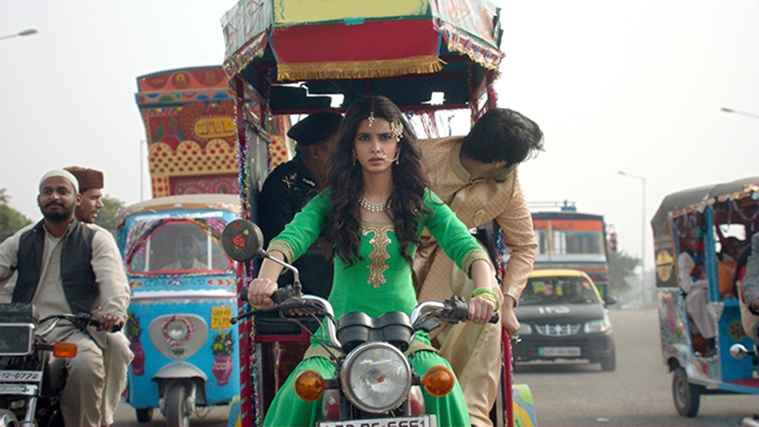By RAHUL DESAI
Director: Mudassar Aziz
Cast: Diane Penty, Abhay Deol, Jimmy Shergill, Piyush Mishra, Ali Fazal, Momal Sheikh
If you ignore the ominous B-movie title, Happy Bhag Jayegi, written and directed by Mudassar Aziz, who is clearly from (producer) Anand L. Rai’s (Raanjhana, Tanu Weds Manu) stable of overcrowded flavours, is a funny movie until the comedy-of-errors syndrome takes over. Despite a second half of Priyadarshan-ish disposition, it’s one of those infectious films I’d re-watch on television for its scenes and one liners and audacious characters, without really bothering to feel it as a whole. I wonder why most filmmakers still feel the need to infuse their material with chaos-induced laughs; situational humour isn’t necessarily derived from an excess of simultaneous situations.
Aziz could have relied on a lesser number of bodies after laying the foundation: A runaway bride from Amritsar named Happy (Diana Penty) finds herself in Lahore after jumping into the wrong truck sent by her suitor, Guddu (Ali Fazal). The jilted groom, of course, as always, is Jimmy Shergill (as aspiring MLA, Bagga), whom one can’t visualise anymore without aviator glasses and a Haryanvi jeep full of goons. It falls upon Bilal (Abhay Deol), the conflicted heir of the Pakistani ex-governor, to somehow reunite them while navigating his own set of poor-rich-boy existential issues. This, in itself, is a plot full of cross-cultural possibilities. And for most part, the director explores them with his own (bouts of) sharp writing and a fine supporting ensemble.
At one point, the India-phobic Pakistani cop named Afridi (an inimitable Piyush Mishra, whose hamming works as a foil to Deol’s poker-face), who Bilal has sent to bring Guddu to Lahore (don’t ask), exchanges drunken banter with the younger man. Guddu waxes eloquent about how Urdu lends such elegance to the most mundane phrases (his example: ‘Tashreef rakhiye’), and both of them burst into a fit of appreciative giggles. Suddenly, Afridi wonders if he is being made fun of – a perfect behavioural metaphor for the two emotional and politically incorrect nations. When some contrived hell breaks loose seconds later, Guddu sneaks in a ‘Tashreej laaye’ to jumpstart the confused cop into action. The film excels in these unobtrusive gems (Another example: Happy’s father chases Bilal’s car in search of his daughter; “Stop talking on the phone while driving!” he yells, completely offhand). If you catch these hidden moments in between the louder attention-seeking pieces (crass Jatt interpretations of chaste Urdu words), many happy hoots are at hand. In addition, some character traits serve as running jokes – Bilal’s father’s repetitive ‘Make history in Pakistan’ statement (notice how the accompanying music goes all proud and patriotic), Bagga’s ‘Do you know how many cards I printed for this wedding?’ rants, and Afridi’s untimely ‘I wish we had these in Pakistan’ throwaways.
Surprisingly, perhaps the most forgettable presence is that of Happy’s, who doesn’t have enough screen time to even merit Bilal’s budding fondness for her. His posh fiancé, Zoya (Pakistani actress Momal Sheikh), has more of an arc with him; for once, the snooty lady is painted as more than just a third wheel in an otherwise-unnecessary triangle. They reach a stagnant point where all we see is Zoya staring longingly at Bilal, who stares blankly at Happy’s happiness.
The reason for this gaffe seems to be a clear idolization of the Tanu Weds Manu films and their clutter-breaking gender politics. Happy is blindly based on Kangana Ranaut’s flaky Tanu – which is why Bilal, and even Guddu, seems to be obsessed with the director’s idea of her, rather than a living, breathing and original personality. Together, they form two sides of R. Madhavan, but Penty isn’t given enough (except a rushed montage or two) to even develop one side. Sure, she is spunky and carefree and a wild cat; but we only know that by noticing the contrasting temperaments of the men pursuing her.
Maybe it isn’t totally fair to expect a ‘full’ film out of what is largely a template comedy. Then again, feel-good cinema must have its hooks and its payoffs; the laughs can be nervous, relieved, and even sentimental or desperate, instead of just loud finger-pointing guffaws. Things go downhill, both figuratively and literally, when everyone decides to reach a very well-designed Lahore at once – because overpopulating frames and senses seems to be the latest in thing.
Even though this is a far more observed, acted and instinctive caper than most others around, one wishes that Aziz trusted his film a little more. Now that we know what he’s capable of, perhaps he can take forward Rai’s strengths, weed out his weaknesses (narrative), and become more than just a crafty pretender.
Rating: 3 stars
[Note: The director’s first film was the 2010 dud, Dulha Mil Gaya, starring Fardeen Khan and Sushmita Sen. If he continues with this exponential rate of improvement, his third will be his Lagaan]







Leave A Comment
You must be logged in to post a comment.